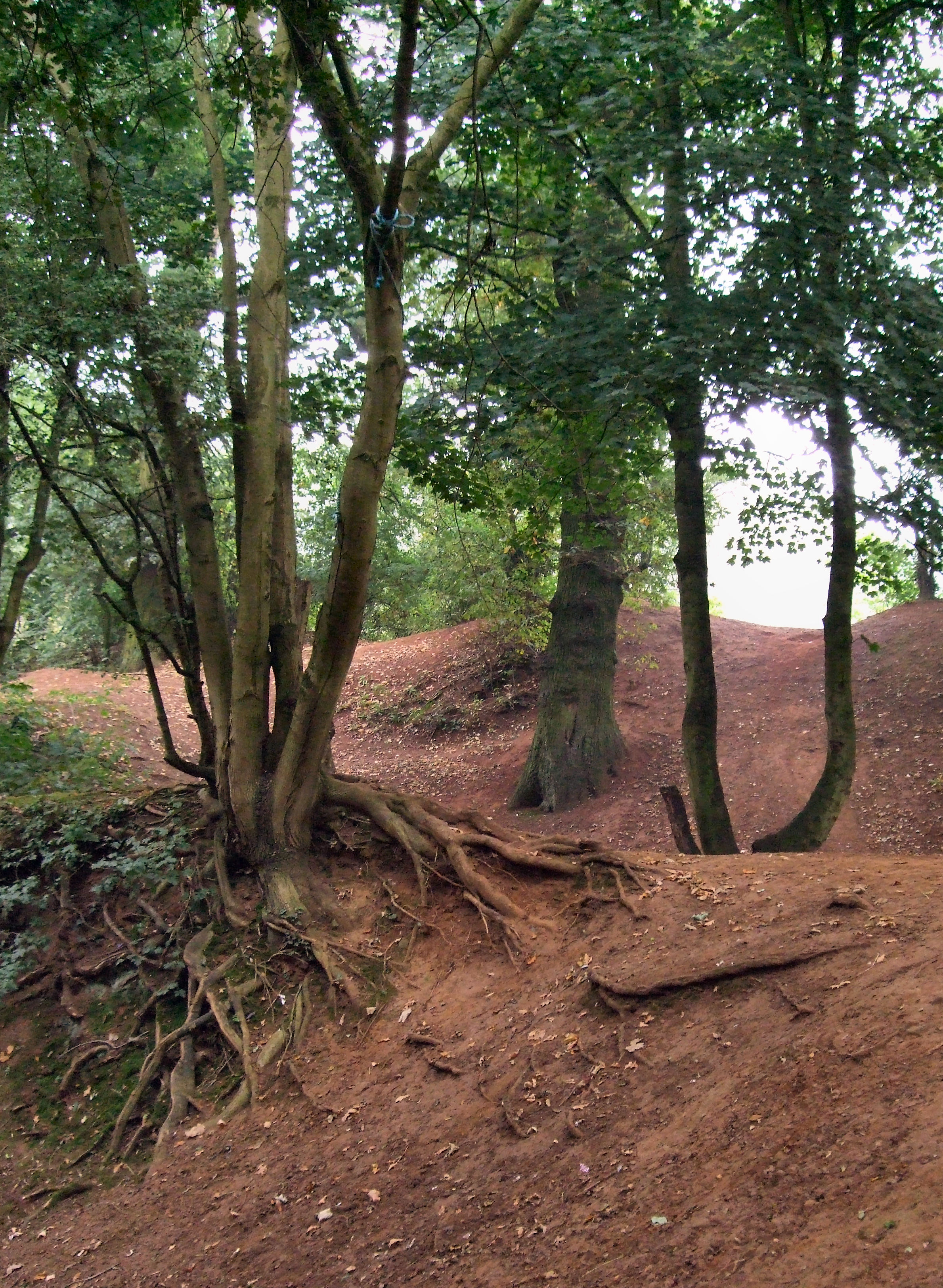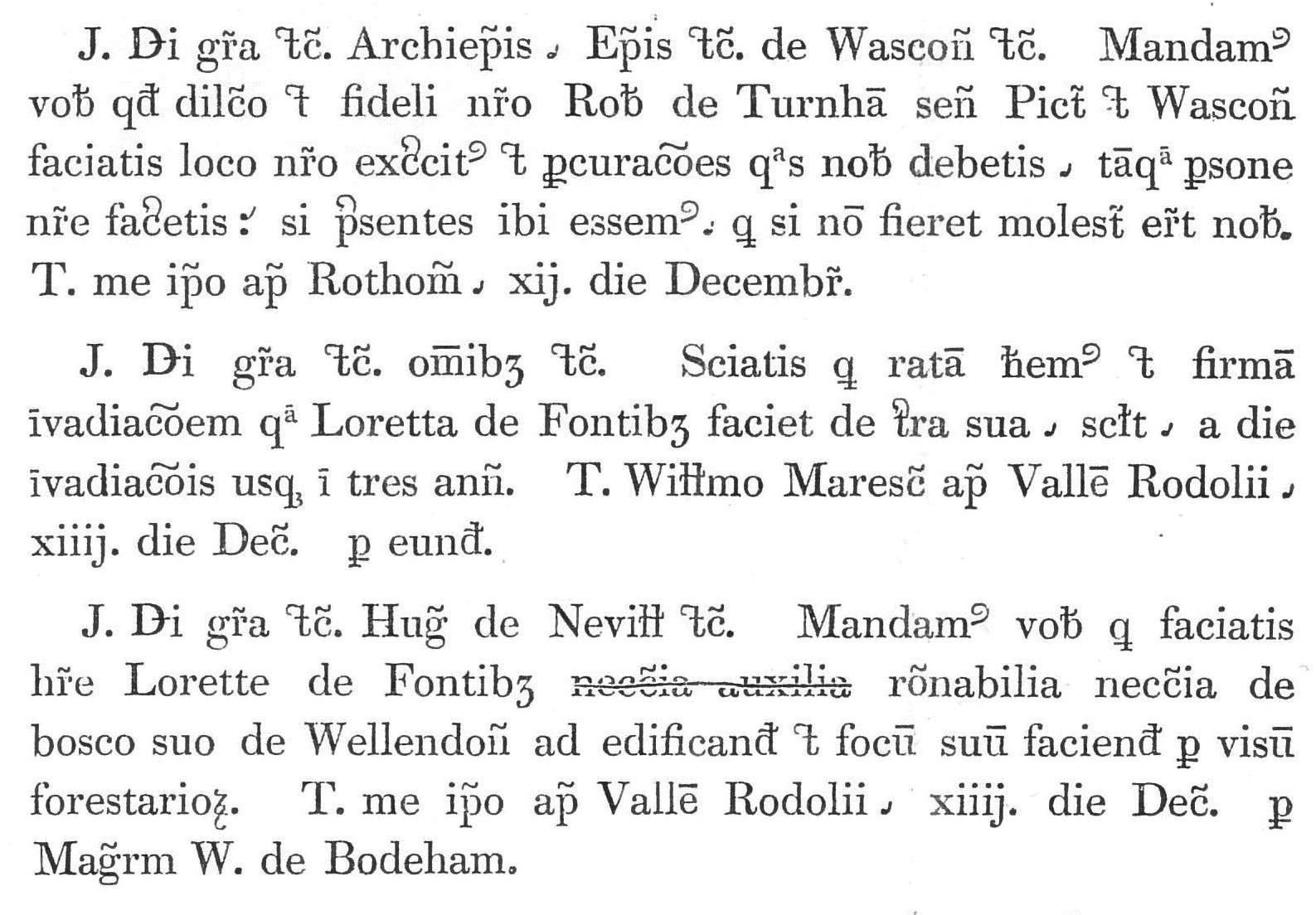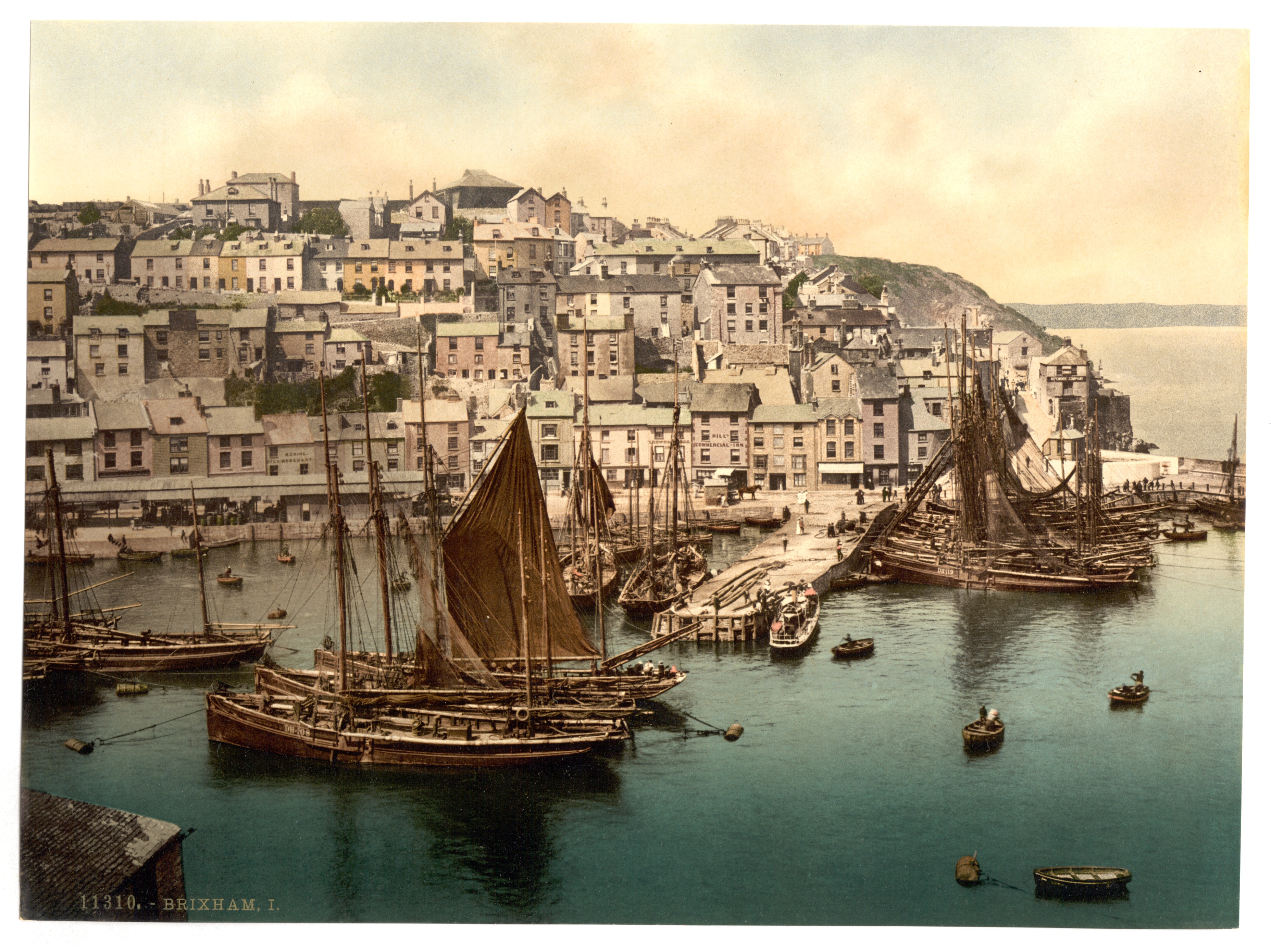|
William De Whithurst
William de Whithurst (died after 1350) was an English Crown official, who held office as a judge in Ireland. He appears to have been a native of Gloucester, where he was the tenant of lands formerly held by William de Holyns. He was a clerk in the English Chancery by the mid-1320s, and he was said to have given "long and faithful service" to the Crown. The best evidence for his activities before 1346 lies in two petitions dating from 1331. William petitioned King Edward III for relief against being distrained by the Exchequer for debts owed to the Crown by the late Edmund, Earl of Kent, the King's uncle, of whose property he had been appointed Keeper, claiming that he had a letter under the Privy Seal discharging him from liability for the debt; an endorsement on the petition shows that this plea was accepted. He also petitioned to be cleared of liability for a sum of £100 given to him by the late King Edward II, during the conflict which led to King Edward's final downfa ... [...More Info...] [...Related Items...] OR: [Wikipedia] [Google] [Baidu] |
English Crown
This list of kings and reigning queens of the Kingdom of England begins with Alfred the Great, who initially ruled Wessex, one of the seven Anglo-Saxon kingdoms which later made up modern England. Alfred styled himself King of the Anglo-Saxons from about 886, and while he was not the first king to claim to rule all of the English, his rule represents the start of the first unbroken line of kings to rule the whole of England, the House of Wessex. Arguments are made for a few different kings thought to have controlled enough Anglo-Saxon kingdoms to be deemed the first king of England. For example, Offa of Mercia and Egbert of Wessex are sometimes described as kings of England by popular writers, but it is no longer the majority view of historians that their wide dominions are part of a process leading to a unified England. Historian Simon Keynes states, for example, that "Offa was driven by a lust for power, not a vision of English unity; and what he left was a reputation, not ... [...More Info...] [...Related Items...] OR: [Wikipedia] [Google] [Baidu] |
Master Of The Rolls In Ireland
The Master of the Rolls in Ireland was a senior judicial office in the Irish Chancery under English and British rule, and was equivalent to the Master of the Rolls in the English Chancery. Originally called the Keeper of the Rolls, he was responsible for the safekeeping of the Chancery records such as close rolls and patent rolls. The office was created by letters patent in 1333, the first holder of the office being Edmund de Grimsby. As the Irish bureaucracy expanded, the duties of the Master of the Rolls came to be performed by subordinates and the position became a sinecure which was awarded to political allies of the Dublin Castle administration. In the nineteenth century, it became a senior judicial appointment, ranking second within the Court of Chancery behind the Lord Chancellor of Ireland. The post was abolished by the Courts of Justice Act 1924, passed by the Irish Free State established in 1922. History of the Office Until the sixteenth century, the Master of the Rol ... [...More Info...] [...Related Items...] OR: [Wikipedia] [Google] [Baidu] |
Oxford University Press
Oxford University Press (OUP) is the university press of the University of Oxford. It is the largest university press in the world, and its printing history dates back to the 1480s. Having been officially granted the legal right to print books by decree in 1586, it is the second oldest university press after Cambridge University Press. It is a department of the University of Oxford and is governed by a group of 15 academics known as the Delegates of the Press, who are appointed by the vice-chancellor of the University of Oxford. The Delegates of the Press are led by the Secretary to the Delegates, who serves as OUP's chief executive and as its major representative on other university bodies. Oxford University Press has had a similar governance structure since the 17th century. The press is located on Walton Street, Oxford, opposite Somerville College, in the inner suburb of Jericho. For the last 500 years, OUP has primarily focused on the publication of pedagogical texts and ... [...More Info...] [...Related Items...] OR: [Wikipedia] [Google] [Baidu] |
Brixham Harbour In Summer
Brixham is a coastal town and civil parish, the smallest and southernmost of the three main population centres (the others being Paignton and Torquay) on the coast of Torbay in the county of Devon, in the south-west of England. Commercial fishing and tourism are the two main industries. As of 2020 Brixham had an estimated population of 16,823. It is believed that the name Brixham originates from the personal name of an early resident, Brioc, followed by the Old English suffix, ''ham'' meaning home. The town, which is predominantly hilly, is built around a picturesque natural harbour, which in addition to leisure craft, provides anchorage for what is now one of England’s (but not the UK’s) largest remaining commercial fishing fleets. A conspicuous local tourist attraction is the permanently moored replica of Sir Francis Drake's ship '' Golden Hind''. Historically Brixham was made up of two separate communities connected only by a marshy lane. In Fishtown, in the immediate ... [...More Info...] [...Related Items...] OR: [Wikipedia] [Google] [Baidu] |
Northampton
Northampton () is a market town and civil parish in the East Midlands of England, on the River Nene, north-west of London and south-east of Birmingham. The county town of Northamptonshire, Northampton is one of the largest towns in England; it had a population of 212,100 in its previous local authority in the United Kingdom Census 2011, 2011 census (225,100 as of 2018 estimates). In its urban area, which includes Boughton, Northamptonshire, Boughton and Moulton, Northamptonshire, Moulton, it had a population of 215,963 as of 2011. Archaeological evidence of settlement in the area dates to the Bronze Age Britain, Bronze Age, Roman conquest of Britain, Romans and Anglo-Saxons, Anglo-Saxons. In the Middle Ages, the town rose to national significance with the establishment of Northampton Castle, an occasional royal residence which regularly hosted the Parliament of England. Medieval Northampton had many churches, monasteries and the University of Northampton (thirteenth century), ... [...More Info...] [...Related Items...] OR: [Wikipedia] [Google] [Baidu] |
Patent Rolls
The patent rolls (Latin: ''Rotuli litterarum patentium'') are a series of administrative records compiled in the English, British and United Kingdom Chancery, running from 1201 to the present day. Description The patent rolls comprise a register of the letters patent issued by the Crown, and sealed "open" with the Great Seal pendent, expressing the sovereign's will on a wide range of matters of public interest, including – but not restricted to – grants of official positions, lands, commissions, privileges and pardons, issued both to individuals and to corporations. The rolls were started in the reign of King John, under the Chancellorship of Hubert Walter. The texts of letters patent were copied onto sheets of parchment, which were stitched together (head-to-tail) into long rolls to form a roll for each year. As the volume of business grew, it became necessary to compile more than one roll for each year. The most solemn grants of lands and privileges were issued, not as l ... [...More Info...] [...Related Items...] OR: [Wikipedia] [Google] [Baidu] |
Devon
Devon ( , historically known as Devonshire , ) is a ceremonial and non-metropolitan county in South West England. The most populous settlement in Devon is the city of Plymouth, followed by Devon's county town, the city of Exeter. Devon is a coastal county with cliffs and sandy beaches. Home to the largest open space in southern England, Dartmoor (), the county is predominately rural and has a relatively low population density for an English county. The county is bordered by Somerset to the north east, Dorset to the east, and Cornwall to the west. The county is split into the non-metropolitan districts of East Devon, Mid Devon, North Devon, South Hams, Teignbridge, Torridge, West Devon, Exeter, and the unitary authority areas of Plymouth, and Torbay. Combined as a ceremonial county, Devon's area is and its population is about 1.2 million. Devon derives its name from Dumnonia (the shift from ''m'' to ''v'' is a typical Celtic consonant shift). During the Briti ... [...More Info...] [...Related Items...] OR: [Wikipedia] [Google] [Baidu] |
Brixham
Brixham is a coastal town and civil parish, the smallest and southernmost of the three main population centres (the others being Paignton and Torquay) on the coast of Torbay in the county of Devon, in the south-west of England. Commercial fishing and tourism are the two main industries. As of 2020 Brixham had an estimated population of 16,823. It is believed that the name Brixham originates from the personal name of an early resident, Brioc, followed by the Old English suffix, ''ham'' meaning home. The town, which is predominantly hilly, is built around a picturesque natural harbour, which in addition to leisure craft, provides anchorage for what is now one of England’s (but not the UK’s) largest remaining commercial fishing fleets. A conspicuous local tourist attraction is the permanently moored replica of Sir Francis Drake's ship ''Golden Hind''. Historically Brixham was made up of two separate communities connected only by a marshy lane. In Fishtown, in the immediate v ... [...More Info...] [...Related Items...] OR: [Wikipedia] [Google] [Baidu] |
Edward III Of England
Edward III (13 November 1312 – 21 June 1377), also known as Edward of Windsor before his accession, was King of England and Lord of Ireland from January 1327 until his death in 1377. He is noted for his military success and for restoring royal authority after the disastrous and unorthodox reign of his father, Edward II. EdwardIII transformed the Kingdom of England into one of the most formidable military powers in Europe. His fifty-year reign was one of the longest in English history, and saw vital developments in legislation and government, in particular the evolution of the English Parliament, as well as the ravages of the Black Death. He outlived his eldest son, Edward the Black Prince, and the throne passed to his grandson, Richard II. Edward was crowned at age fourteen after his father was deposed by his mother, Isabella of France, and her lover Roger Mortimer. At age seventeen he led a successful coup d'état against Mortimer, the ''de facto'' ruler of the coun ... [...More Info...] [...Related Items...] OR: [Wikipedia] [Google] [Baidu] |
Judge
A judge is a person who presides over court proceedings, either alone or as a part of a panel of judges. A judge hears all the witnesses and any other evidence presented by the barristers or solicitors of the case, assesses the credibility and arguments of the parties, and then issues a ruling in the case based on their interpretation of the law and their own personal judgment. A judge is expected to conduct the trial impartially and, typically, in an open court. The powers, functions, method of appointment, discipline, and training of judges vary widely across different jurisdictions. In some jurisdictions, the judge's powers may be shared with a jury. In inquisitorial systems of criminal investigation, a judge might also be an examining magistrate. The presiding judge ensures that all court proceedings are lawful and orderly. Powers and functions The ultimate task of a judge is to settle a legal dispute in a final and publicly lawful manner in agreement with substantial p ... [...More Info...] [...Related Items...] OR: [Wikipedia] [Google] [Baidu] |
Edward II Of England
Edward II (25 April 1284 – 21 September 1327), also called Edward of Caernarfon, was King of England and Lord of Ireland from 1307 until he was deposed in January 1327. The fourth son of Edward I, Edward became the heir apparent to the throne following the death of his elder brother Alphonso. Beginning in 1300, Edward accompanied his father on invasions of Scotland. In 1306, he was knighted in a grand ceremony at Westminster Abbey. Following his father's death, Edward succeeded to the throne in 1307. He married Isabella, the daughter of the powerful King Philip IV of France, in 1308, as part of a long-running effort to resolve tensions between the English and French crowns. Edward had a close and controversial relationship with Piers Gaveston, who had joined his household in 1300. The precise nature of their relationship is uncertain; they may have been friends, lovers, or sworn brothers. Edward's relationship with Gaveston inspired Christopher Marlowe's 15 ... [...More Info...] [...Related Items...] OR: [Wikipedia] [Google] [Baidu] |
Privy Seal Of England
The Privy Seal of England originally served to authenticate the king's personal communication and can be traced back to the reign of King John in the early thirteenth century. While the Great Seal was required to remain in Chancery, the Privy Seal travelled with the sovereign. However, during the second half of King Edward III's reign, in the mid-fourteenth century, the Office of the Privy Seal took on various additional government roles. This led to the development of a third seal, known at first as the "secret" seal, to handle the private communication that had been the original remit of the Privy Seal. By the end of Edward III's reign, this seal was known as the Signet and was in the custody of the King's Secretary. As such it is the precursor to the seals of office held by today's Secretaries of State. The Great Seal Act 1884 effectively ended the use of the Privy Seal by providing that it was no longer necessary for any instrument to be passed under the Privy Seal. Kee ... [...More Info...] [...Related Items...] OR: [Wikipedia] [Google] [Baidu] |
_-_Portrait_of_William_Robert_Fitzgerald%2C_2nd_Duke_of_Leinster.jpg)
.jpg)






